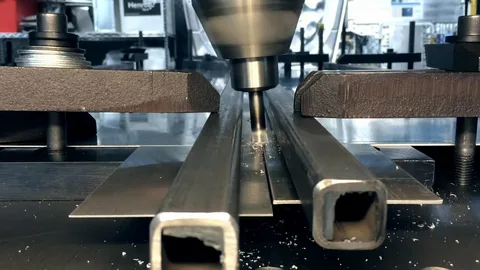Friction Stir Welding (FSW) is a revolutionary technique in the field of welding that has gained immense popularity in modern manufacturing. It is a solid-state joining process that uses a rotating tool to generate frictional heat and mechanically stir the materials to form a strong bond. Unlike traditional welding methods, such as arc welding or laser welding, FSW offers several unique benefits that make it an ideal choice for various industries, including aerospace, automotive, and shipbuilding. This article explores the top advantages of Friction Stir Welding and how it is transforming modern manufacturing.
Enhanced Strength and Durability
One of the primary advantages of Friction Stir Welding is its ability to produce joints that are significantly stronger than those created by conventional welding methods. Since FSW operates in a solid-state, it eliminates issues related to melting and cooling, which often leads to weaknesses in the welded joints. This results in a more uniform structure and better material integrity. The process's precise control over heat generation allows it to maintain the mechanical properties of the base materials, even at the joint interface.
Additionally, FSW produces joints that are resistant to cracks, voids, and porosity, which are common defects in fusion welding processes. As a result, welded components exhibit superior mechanical performance and longer-lasting durability. In industries like aerospace and automotive, where safety and reliability are crucial, the enhanced strength of FSW joints provides a clear advantage. The ability to weld high-strength materials like aluminum, titanium, and steel further reinforces the value of Friction Stir Welding in demanding applications.
Cost Efficiency and Reduced Energy Consumption
Friction Stir Welding is a cost-effective solution for many modern manufacturing operations. Compared to traditional welding methods, FSW consumes significantly less energy because it does not require the high temperatures associated with melting the materials. This not only reduces the energy consumption of the welding process but also lowers the overall operating costs. Additionally, the minimal need for consumables such as filler materials or shielding gases makes FSW an economically viable option.
Furthermore, Friction Stir Welding helps reduce post-welding processes, such as cleaning, grinding, and heat treatment, which are often necessary in conventional welding techniques. The high-quality welds produced by FSW reduce the need for extensive finishing work, saving both time and labor costs. For manufacturers seeking ways to streamline production and maximize profitability, FSW offers a highly efficient and economical alternative to other welding techniques.
Environmental Benefits
As industries increasingly focus on sustainability and minimizing their environmental impact, Friction Stir Welding provides a compelling advantage due to its lower ecological footprint. Unlike fusion welding methods, which release harmful fumes and gases as a result of the high heat used in the process, FSW is a clean, solid-state process that does not emit toxic byproducts. This makes it a more environmentally friendly option, as it contributes to a safer and cleaner working environment for operators.
In addition to reducing harmful emissions, Friction Stir Welding also helps minimize material waste. The solid-state nature of the process ensures that there is no melting of the workpiece, which means less material is lost during the welding process. This leads to a more efficient use of resources, which is an important consideration for industries striving to reduce waste and increase the sustainability of their operations. As environmental regulations become more stringent, the eco-friendly benefits of FSW make it a valuable tool for modern manufacturers.
Ability to Weld Dissimilar Materials
Friction Stir Welding offers a unique advantage in its ability to join dissimilar materials that would typically be challenging to weld using traditional methods. In industries such as automotive and aerospace, the need to combine materials with different properties, such as aluminum and steel, is increasingly common. However, traditional welding processes often struggle with issues such as poor weld quality, distortion, and the formation of brittle intermetallic compounds when joining these materials.
FSW overcomes these challenges by allowing the materials to remain in their solid state during the welding process, reducing the risk of undesirable reactions. The mechanical stirring action of the tool creates a metallurgically sound bond, even between materials with vastly different melting points. This ability to join dissimilar materials opens up new possibilities for lightweight, high-strength applications, such as the creation of composite structures in the automotive and aerospace industries. Manufacturers can now design products with optimized material properties, achieving the desired strength-to-weight ratios without compromising on weld quality.
Versatility and Automation Potential
Friction Stir Welding is a versatile process that can be applied to a wide range of materials and thicknesses. It is commonly used for aluminum and its alloys, but it is also effective for welding copper, magnesium, titanium, and even certain steels. This versatility makes it suitable for a broad spectrum of industries, including shipbuilding, rail transport, and renewable energy, where different materials are used in construction.
Moreover, FSW lends itself well to automation, making it an ideal choice for high-volume production environments. The process can be fully automated with robotic systems, which not only increases production efficiency but also ensures consistent quality and repeatability. Automated Friction Stir Welding systems can operate continuously, reducing the need for manual intervention and allowing manufacturers to meet demanding production schedules. This scalability and automation potential make FSW an attractive option for companies looking to optimize their manufacturing processes and remain competitive in the market.
Conclusion
Friction Stir Welding is transforming modern manufacturing by offering several advantages over traditional welding methods. Its ability to produce stronger, more durable joints, combined with cost efficiency, environmental benefits, and versatility, makes it a game-changer for industries that require high-quality welds. From aerospace to automotive, FSW is allowing manufacturers to create stronger, lighter, and more sustainable products. As the technology continues to evolve and gain traction across various sectors, Friction Stir Welding is set to play a pivotal role in the future of manufacturing, driving innovation and efficiency across the globe.

